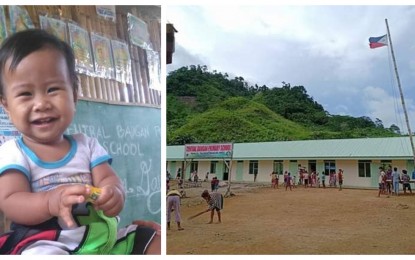
IP LEARNERS. On the outskirts of Davao del Norte is the municipality of Talaingod where the esteemed Ata Tribe resides. The indigenous people (IP) leaders fought for quality education to be accessible for their children and got rid of Salugpongan schools. (Contributed photo by Datu Joel Dahusay)
MANILA -- The National Youth Commission (NYC) urged the government's educational agencies to accommodate indigenous people (IP) learners following the closure of Salugpongan Ta’ Tanu Igkanogon Community Learning Center, Inc. (STTICLCI) schools in the Davao region.
“With the recent formal closure of all 55 Lumad schools operated by the Salugpongan Ta’Tanu Igkanogon Community Learning Center, Inc. (STTICLCI) in the Davao region, NYC urges DepEd to facilitate the accommodation of the students as soon as possible to nearby DepEd-run schools,” the NYC said in a statement Monday.
The youth commission said local government units should work with the community leaders to ensure the right to education of IP children.
It also laid out several proposed long-term plans in providing a quality education that would upskill the IPs. These are:
(1) The National Commission on Indigenous Peoples may tap IP para teachers to help develop and deliver a community-based and culturally sensitive curriculum that is both aligned with their cultural identity and with the national standards.
(2) The Commission on Higher Education may also consider providing access to scholarships to these para teachers to study teacher education so that they can soon get a professional license to teach in these schools.
(3) The Technical Education and Skills Development Authority - TESDA Philippines (TESDA) may also provide alternative technical-vocational training for out-of-school youth and assist in livelihood programs in the affected areas.
The NYC also urged for educational agencies to put up more learning institutions that align with the contexts of IP communities to preserve their culture.
Currently, only a few teachers are assigned in communities where the IPs live. Most of them are members of the tribe who graduated as educators and went back to serve them.
Among them is Datu Joel Dahusay, a daycare worker under the Municipal Social Welfare Development of Talaingod in Davao del Norte.
Dahusay is delighted to hear the message of support from the youth commission and expressed hope that this “will just be the beginning”.
“Daghan ang nag pasalamat kay para sa tribo klaro nga naay silay maton-an og maabot sa kabataan ang tinguha nga mo lampos og naay maayong ugma… Kaysa skwelahan sa NPA salugpungan na dal on ang mga bata sa way klarong panaaging pagtulon an (A lot of people in the tribe are thrilled because it’s now a guarantee that our children will really learn useful stuff. Unlike New People’s Army’s Salugpungan where they lead our kids to miserable path),” Dahusay said in an interview on Monday.
He added that many in his community are looking forward to enrolling in TESDA-accredited schools so they would earn a decent income.
“Ganahan mi ug TESDA kay aron maka-trabaho sa kompanya og ma develop pa ang ilang kahibalo nga mo sustain ang ilng panginahi bisan og wala makahuman og skwela kolehiyo (We like TESDA so we can learn and work in a company. To develop our thinking and sustain our livelihood even if one did not finish college),” he said.
Earlier, the Department of Education said it is eyeing the construction of more classrooms and other educational facilities for the IP learners in Davao del Norte. (PNA)
